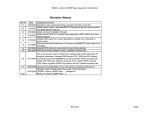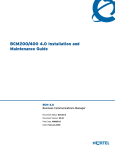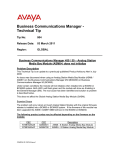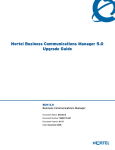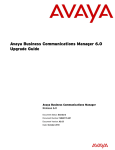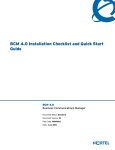Download Avaya BCM1000/200/400/450/50 User's Manual
Transcript
avaya.com Product Bulletin Document Number: P-2007-0169 Date: 16 December 2011 BCM1000/200/400/450/50 Keycode Migration Process Revision History Date 11 July 2007 Revision # Original bulletin Summary of Changes This is the original publication 3 August 2007 Revision 1 Delay availability of Application migration authorization code to August 20, 2007 14 December 2007 Revision 2 Clarify product return options and instructions 30 January 2008 Revision 3 Clarify regional applicability and return locations. 20 October 2008 Revision 4 Add BCM 450 and update regional procedures as well as remove reference to expired rebate program. 4 November 2009 Revision 5 Add information about Keycode Migration process for BCM50 to BCM450 migration. 16 December 2011 Revision 6 Update of return information for equipment that needs to be returned after migration. Update Reason This document has been updated to reflect changed contact information for the Avaya Repair Services organization to request the return of BCM hardware that the needs to be returned to Avaya after an Emergency Keycode Regeneration or License Migration from BCM50 or BCM200/400/1000 to BCM450. Introduction This is an update to the bulletin published to inform Partners of a service to allow the transfer of software licenses to enable migration of BCM applications from one system to another for a given customer. This update provides information about a new capability that enables migration of keycodes from a BCM50 system to a BCM450 system. This new capability is introduced in BCM Rls 5.0 and allows customers to retain the value of their investment in BCM software when replacing a BCM50 system with a larger BCM450 system. 1 avaya.com Service Description Avaya recognizes the importance of protecting the investments that customers make in BCM software and applications. Being able to retain the value of this investment when changing or upgrading their BCM platform is key to customers. The Keycode Migration capability is geared at making this possible in the context of a wide range of migration or platform upgrade scenarios. In this bulletin revision, Avaya is pleased to announce the continued support for this service and the introduction of a keycode migration capability to support migration from BCM50 to BCM450. Keycode Migration for BCM200/400/1000 to BCM450 This solution allows migration of purchased software licenses from any BCM1000, BCM200 or BCM400 to a new BCM450 system. This service and capability is intended to allow an existing customer to migrate their enabled keycodes to the new BCM450 platform for a transfer fee, represented in the price of the "BCM450 Keycode Migration from BCM200/400/1000 Rel 4.0 Authorization Code". This Keycode Migration capability is also an element of the BCM200/400 Rls 4.0 to Rls 5.0 Hardware & Software Upgrade Kit which includes the "BCM450 Keycode Migration from BCM200/400/1000 Rel 4.0 Authorization Code". If the original or source system is not at release 4.0 level, a BCM 4.0 upgrade keycode will be required in KRS prior to the Keycode Migration operation. Keycode Migration from BCM50 to BCM450 This solution allows migration of software licenses purchased and installed on an existing BCM50 system to a new BCM450 system running software release 5.0. Customers who expect their capacity requirements to grow beyond the capacity of their BCM50 system may consider replacing it with a higher capacity BCM450 system. With this solution, customers will retain relevant software investment when performing such a replacement. This feature is enabled by the purchase of a BCM450 Keycode Migration from BCM50 Authorization Code. The authorization code can then be used in the KRS environment to migrate the feature entitlements from the source BCM50 system to the target BCM450 system – the KRS user will use the “Migration of Keycode” menu item in KRS. With this feature, all relevant feature entitlements are migrated from the BCM50 system to the BCM450 system in one transaction. Some feature entitlements are not applicable to the BCM450 systems and are therefore not migrated – these are: • Analog Station Port Authorizations • Digital Station Port Authorizations • Analog Trunk Port Authorizations • BRI Trunk Port Authorizations • BCM50 Software Upgrade licenses 2 avaya.com The BCM50 system must be at software release 2.0, 3.0 or 5.0, or in the case of a BCM50 system running software release 1.0, a BCM50 Rls 1.0 to 3.0 software upgrade authorization codes must be purchased and applied in KRS prior to the Keycode Migration operation. This feature is to be used only if the BCM50 system is replaced by the BCM450 system. As a condition of use of this feature, the source BCM50 system must be sent to Avaya after the migration is completed. Keycode Migration from BCM1000/200/400 to BCM1000/200/400 This solution allows migration of purchased software licenses from any BCM1000, BCM200 or BCM400 to another BCM1000, BCM200 or BCM400 system. If the destination system is a BCM200/400 at Rls 4.0 software level there is no need to purchase a BCM 4.0 upgrade keycode separately. When re-‐generating the keycodes on KRS, just specify 4.0 as the desired keycode format for the re-‐generated keycodes. The solution entails purchasing of the BCM Application Migration Paper Authorization Code via standard catalog ordering procedures, and utilizing this keycode in conjunction with KRS to provide regeneration of application capabilities between BCM systems. Restrictions and Limitations While the service will transfer/regenerate keycode capabilities on the destination BCM system, standard backup and restore procedures will be required to ensure system programming can be replicated on the destination system. Note that backup and restore is only supported within the same BCM platform and software release. Per standard application regeneration policies, KRS must have a record of all or part of the applications enabled on the source BCM system. If this is not the case, proof of purchase of the applications enabled on the source BCM system, as well as the original authorization number or numbers, will be required. If this is not available, only those software licenses on record in KRS for the source MSC or BCM50 unit will be regenerated to the new BCM system. Keycodes are licensed for use to the BCM customer on only one BCM system at a time. The destination BCM must be clean of any keycodes in order to accept the migrated Keycode entitlements. If additional authorization codes are to be applied to the new BCM, they must be applied after the Keycode Migration operation. Required Information Partners utilizing this capability will be required to have access to KRS, have the source system ID (MSCID for BCM200/400/1000 or BCM50 system ID) and destination system ID (BCM450 System ID or MSCID for BCM200/400/1000), and have purchased the appropriate Application/Keycode Migration Authorization Code (in paper format or electronic format) as listed in the Global Product and Pricing Catalog (GPPC) and pre-‐requisite upgrade authorization codes if appropriate. Return of either the source BCM50 main unit, MSC or BCM200/400/1000 System (with MSC card) hardware will be required to avoid charges for equivalent application capability costs. Either an Avaya RMA number or Serial number of the returned hardware will be required at time of migration/regeneration. Process Flow 3 avaya.com The solution entails purchasing an Keycode/Application Migration Authorization Code via standard catalog ordering procedures, and utilizing this keycode in conjunction with KRS to provide migration/ regeneration of application capabilities between BCM systems for a given customer. A simplified visual representation of the process flow follows: Event requiring Keycode Migration or Regeneration For Migration events, order Application Migration Authorization Code User enters BCM KRS Main page User selects Migration of Keycodes (from side bar) User is asked to enter their purchased Application Migration Authorization Code (for Migration events only) User is presented with process acceptance checkbox User is then asked to enter user’s Company details, End Customer details, serial number of the returning hardware (non-‐A class return) or RMA# (if A Class return), and GNTS Case ID (if migration enter NA in this field) User then is asked to enter source and destination BCM System ID or MSCID KRS performs the regeneration of the application capabilities to the new BCM System ID or MSCID Return original BCM hardware to Nortel or Nortel repair depot as per standard return processes 4 avaya.com Avaya will continue to support software license migration for disaster recover scenarios without the requirement to purchase an Application Migration Authorization Code. Return of Hardware In either case of disaster recovery or keycode migration, regeneration of keycodes will require a hardware return (either an MSC card or BCM System) to avoid charges for keycodes remaining on the source platform. Please note that all defective returns will be directed to either Avaya if A Class returns, or to Avaya repair depot (please see location table below for Avaya repair depot. if outside of 90 day DOA timeframe, otherwise noted as B class returns. A Class returns applicable to this scenario will typically be for systems that fail within the 90 day DOA/OBF criteria per the Returns Routing Guide, see below for reference. For A class (DOA/OBF) returns, enter the Avaya RMA number in the appropriate field on the KRS Keycode Regeneration page. If an Avaya RMA number is not available at the time of regeneration, the user will be reminded via an email of the need for an RMA. Also, unless a problem has been diagnosed to the MSC, the entire system will need to be returned. For B class returns (past the A Class (DOA/OBF) 90 day interval), users may choose to return the entire BCM system, or return the MSC only – in the case of Keycode Migration from BCM50 to BCM450, the BCM50 main unit must be returned. At the time of migration/regeneration and while on KRS Website, users will be required to enter the serial number of the source hardware being returned, either the MSC, BCM System or the BCM50 main unit. Users may request either a return only RMA, or a repair order. If the latter, Avaya will provide a refurbished system/MSC in return for the source system/MSC. Repair charges for a Class B replacement system/MSC will apply per current pricing on GPPC for repaired items, assuming the system/MSC is not under warranty. Returned systems or MSC’s under warranty will be replaced at no charge. Note: The same KRS field is used for entry of either the RMA number or the hardware serial number, depending on whether the return will be classified as A Class or B Class. Self Service Option In addition to the Call Center contacts below, customers/channel partners/distributors may go to the Avaya Support website (support.avaya.com) and select Parts Replacement in the right-‐hand Self Service menu. Call Center Option To request the RMA through one of the Avaya Repair Service Call Centers please use the contacts below. United States Partner: CTDI Contact: Email: [email protected] Phone: 1-‐800-‐242-‐2121 5 avaya.com Dial the following options to open an RMA: option2: (Service Request Status) option1: (Part Delivery) option1: (Former Nortel) option1: (Voice Return & Repair) Canada Partner: Telmar Contact: Email: [email protected] Phone: 1-‐800-‐387-‐4268 Dial the following options to open an RMA: option1: (Customer) option1: (Case Creation or Status) option2: (Case Status) option1: (Part Delivery) option1: (Former Nortel) option1: (Voice Return & Repair) Europe, Middle East and Africa (EMEA): Please refer to the Global Support Services -‐ Support Directory to identify regional support contact: http://support.avaya.com/css/appmanager/public/support?_nfpb=true&_pageLabel=Support_Directory_Public Asia Pacific (APAC): No call center is available in APAC for BCM Repair Services. Please contact: [email protected] Requests for “return only” RMA’s can be made directly to the representative taking the RMA request. For more information on return procedures, please refer to support.avaya.com. Location and Format of Serial Numbers The serial numbers are in one of the two following formats 1) NNTM followed by 8 alpha-‐numeric characters or 2) LBNNTM followed by 10 alpha-‐numeric characters. It is important to provide this information completely and accurately so that Avaya can validate the returned hardware against the regeneration activity. For BCM systems the serial number is located on the product identification label. • BCM1000/200/400/450: on the rear of the chassis. 6 avaya.com • BCM50: the product label is located on the underside of the BCM50 enclosure. For MSC’s, the serial number is located on a label on the “solder side” or back side of the MSC card. Ordering Guidelines and Procedures The BCM Keycode/Application Migration Authorization Codes are available for order. The order codes are: NTKC0950 N0156135 BCM Application Migration Paper Authorization Code NTKC0951 N0156136 BCM Application Migration Electronic License NTC01073KC N0174259 BCM450 Keycode Migration from BCM200/400/1000 Rel 4.0 Authorization Code NTC02029KC N0172465 BCM450 Keycode Migration from BCM200/400/1000 Rel 4.0 Electronic License NTC01106KC N0205050 BCM450 Keycode Migration from BCM50 Paper Authorization Code NTC02037KC N0202677 BCM450 Keycode Migration from BCM50 Electronic Authorization License NTKC0935 N0146690 BCM50 1.0 to 3.0 Upgrade Authorization Code NTKC0937 N0146692 BCM50 Upgrade Electronic Authorization License 1.0 to 3.0 NTKC0945 N0154740 BCM50 1.0 to 3.0 Software Upgrade Authorization Code – EMEA NTKC0947 N0154744 BCM50 1.0 to 3.0 Upgrade Electronic Authorization License 1.0 to 3.0 -‐ EMEA NTKC0273 N0055512 BCM Upgrade BCM 3.7 to BCM 4.0 Software Upgrade Authorization Code NTKC0632 N0136020 BCM Upgrade Electronic Authorization License BCM3.7 to BCM4.0 For BCM1000/200/400 Keycode migration to latest platform software on BCM200/400, only the BCM Application Migration authorization code in either paper format (NTKC0950) or electronic format (NTKC0951) is required. For Keycode migration to BCM450 from a BCM1000/200/400 system with software version Rel. 4.0, only the “BCM450 Keycode Migration from BCM200/400/1000 Rel. 4.0” authorization code in either paper format (NTC01073KC) or electronic format (NTC02029KC) is required. For Keycode migration to BCM450 from a BCM1000/200/400 system with software version Rel. 2.x or Rel. 3.x, the KRS record for the source system must first be upgraded to Rel. 4.0. To accomplish this, use the “BCM Upgrade BCM 3.7 to BCM 4.0 Software Upgrade” authorization code in either paper format (NTKC0273) or electronic format (NTKC0632). The BCM1000/200/400 software does not need to be upgraded, only on KRS. Once the KRS record for the source system is upgraded to Rel. 4.0 keycodes, the “BCM450 Keycode Migration from BCM200/400/1000 Rel. 4.0” authorization code in either paper format (NTC01073KC) or electronic format (NTC02029KC) is used to migrate the application keycodes to the BCM450 platform. For Keycode migration to BCM450 from a BCM50 system, the BCM50 system must be at software release 2.0, 3.0 or 5.0, or in the case of a BCM50 system running software release 1.0, a BCM50 Rls 1.0 to 3.0 software upgrade authorization codes (please see PEC codes in list above) must be purchased and applied in KRS prior to the Keycode Migration operation. 7 avaya.com © 2011 Avaya Inc. All Rights Reserved. Avaya and the Avaya Logo are trademarks of Avaya Inc. and are registered in the United States and other countries. All trademarks identified by ®, TM or SM are registered marks, trademarks, and service marks, respectively, of Avaya Inc. All other trademarks are the property of their respective owners. Avaya may also have trademark rights in other terms used herein. References to Avaya include the Nortel Enterprise business, which was acquired as of December 18, 2009. 02/10 8









